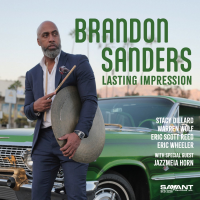Home » History of Jazz Timeline: 1948
History of Jazz Timeline: 1948
Birdland (named after Charlie Parker) opens in New York City.
Notable 1947 Savoy recordings by Charlie Parker can be found on The Charlie Parker Memorial - Vol 2, The Genius of Charlie Parker and Bird at the Roost - Vol 1.
Max Roach and Miles Davis get fed up with Charlie Parker and quit.
Charlie Parker begins recording for Clef/Verve. This will continue until his death in 1955.
Dizzy Gillespie brings his big Bop band to Europe. The impact is great.
The LP is introduced by Columbia. This is significant because it will make it possible to make longer, more spontaneous recordings.
Swing has been all but pushed out by Bop in the U.S. and by Trad in Europe.
Most young players in the U.S. are in the Bop camp.
Clifford Brown is playing in Philadelphia with the likes of Kenny Dorham, Max Roach, J.J. Johnson and Fats Navarro who offered much encouragement.
Humphrey Lyttleton forms his own Trad band in England.
Elements of the coming Cool style are popping up in Woody Herman's recording of Early Autumn.
Stan Kenton borrows Machito's Cuban drummer for a memorable recording of The Peanut Vendor. It is a big hit for Stan.
Kenton and Herman are very influential.
Gil Evans, John Lewis, Gerry Mulligan and John Carisi begin informal meetings to exchange ideas. Miles Davis will be brought in as trumpeter. See the Birth of the Cool CD.
The Miles Davis nonet performs at the Royal Roost on Broadway.
Ornette Coleman graduates high school and goes on the road with a traveling variety show. Ornette gets fired in Natchez for trying to interest other players in Jazz.
Bassist Charles Mingus quits the Lionel Hampton band.
Pianist Hank Jones becomes Ella Fitzgerald's accompanist.
Armstrong forms the first version of the Jazz All Stars with Jack Teagarden on trombone, Barney Bigard on clarinet, Dick Carey on piano, Sid Catlett on drums and Arvell Shaw on bass. Their music fits in with New Orleans revival.
Louis Armstrong performs at the Jazz festival in Nice, France.
Duke Ellington tours England and France. Although his band is on the decline, he wins the Downbeat poll again.
Ben Webster rejoins the Ellington band.
At the age of 3, Keith Jarrett begins to play the piano.
Ray Charles integrates a Country and Western band called the Florida Playboys.
Mitch Miller overdubs Patti Page singing her own harmony on Money, Marbles and Chalk. This might be the first use of this technique.
John Lee Hooker records "Boogie Chillen." This will become his first big hit.
 Fans of Classical and Jazz music Dr Peter Goldmark and William
Bachman invent microgroove or 'high fidelity' playback, thus the 33
1/3 RPM disc is introduced.
Fans of Classical and Jazz music Dr Peter Goldmark and William
Bachman invent microgroove or 'high fidelity' playback, thus the 33
1/3 RPM disc is introduced.
Keyword Search
Disclaimer: Though we have checked our facts, this timeline may contain erroneous information. If you discover errors or omissions, please bring them to our attention.









